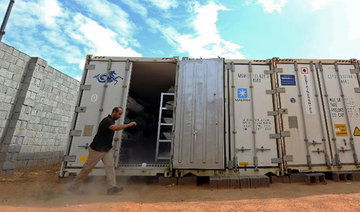BEIRUT: Lebanon’s Prime Minister Najib Mikati called for a ceasefire on Monday in the fighting between Israel and the Iran-backed Hezbollah during a meeting with French Foreign Minister Jean-Noel Barrot in Beirut.
According to a statement from his office, Mikati said: “The key to the solution is to put an end to the Israeli aggression against Lebanon and to revive the appeal launched by the United States and France … in favor of a ceasefire.”
As Israel deploys troops in preparation for a potential ground incursion into Lebanon, and amid the ongoing displacement in the south, Bekaa and Beirut’s southern suburbs, Barrot held discussions in Beirut with Lebanese officials, politicians, religious leaders, and the army.
In a statement issued by the French Embassy, Barrot affirmed that “in the face of the escalating conflict between Israel and Hezbollah, France stands alongside Lebanon and remains committed to protecting civilians, and the security of its citizens.”
Barrot emphasized “France’s support for Lebanon and its people,” adding that “his country is keen on supporting the Lebanese army and helping it during these critical times.”
The plane carrying the French official to Beirut had brought “12 tonnes of medicines and medical supplies in response to emergencies and general medical needs, particularly pediatric care.”
The embassy said that the relief operation was carried out in cooperation with the EU.
During his meeting with Maronite Patriarch Bechara Boutros Al-Rahi, Barrot focused on the “importance of electing a president as a foundation and priority, while emphasizing the need for stopping the war.”
Walid Ghayyad, the media official at the patriarchate, said that Barrot’s visit was “one of solidarity and reconnaissance, aimed at pushing forward key issues.”
Mikati reiterated during his meeting with Barrot that “the gateway to a solution is stopping the Israeli aggression against Lebanon and returning to the call made by the US and France, with the support of the EU and Arab and foreign countries, for a ceasefire.”
He stressed that “the priority is the implementation of UN Security Council Resolution 1701.”
He added: “Once the ceasefire is in effect, we are ready to send the army to the area south of the Litani River to fully carry out its duties in coordination with the international peacekeeping forces in the south.”
Barrot spoke of the “priority of electing a president and working to stop the armed confrontations.”
Barrot announced during his meeting with Health Minister Firass Abiad “the launch of emergency humanitarian aid worth €10 million to support the work of humanitarian organizations on the ground, most notably the Lebanese Red Cross.”
The diplomatic meetings went ahead as the UAE President Sheikh Mohamed bin Zayed Al-Nahyan ordered urgent relief aid to the Lebanese people, valued at $100 million, the Emirates News Agency reported.
In the first appearance of a Hezbollah official since the assassination of Secretary-General Hassan Nasrallah last Friday, Sheikh Naim Qassem, the group’s deputy secretary-general, said in a televised speech: “We will choose a new secretary-general at the earliest opportunity and we will fill leadership positions.
“The brothers continue their work according to the organized structure, and work with alternative plans for individuals and leaders.
“In Hezbollah’s structure there are deputies for the leaders and backup alternatives ready if a leader in any position is incapacitated.”
Qassem added: “Despite losing several leaders, the attacks on civilians, and the great sacrifices, we will not budge an inch from our positions.
“The Islamic resistance will continue to confront the Israeli enemy in support of Gaza and Palestine and defense of Lebanon and its people.”
Qassem stressed that “Hezbollah remains committed to its struggle, and we are fully prepared for a ground engagement and to enter this battle, and we will emerge victorious from it.”
His defiant stance came as Israel killed the leader of Hamas in Lebanon, Fateh Sherif Abu Al-Amin, inside the El Buss camp in the city of Tyre.
His wife, Umayya Ibrahim Abdel Hamid, his son Amin and his daughter Wafaa were also killed in the airstrike that targeted his residence.
Hamas said Abu Al-Amin was “a member of the Hamas leadership abroad.”
An attack on Palestinian leaders in Lebanon occurred at dawn when an Israeli drone targeted a residential apartment in the Cola area of central Beirut, which is close to the Palestinian camps in the city.
The Popular Front for the Liberation of Palestine said that three of its members were killed in the attack, which claimed four lives in total and injured four others, according to the Ministry of Health.
The killing of dozens of civilians has also continued in the face of Israeli airstrikes targeting residential buildings.
Additionally, bombing took place targeting Hezbollah’s supply routes in the high Lebanese mountains, particularly those connecting the Bekaa to other regions. The road to Ainata-Al Ariz was also bombed for the first time.
Five members of the Civil Defense in the Islamic Health Organization, affiliated with Hezbollah, were killed early on Monday in an airstrike targeting their facilities in the town of Sohmor in the Western Bekaa region.
The death toll from an airstrike on a residential building in the town of Ain Al-Dalab, east of the city of Sidon, has risen to 45 with 70 others reported injured, according to the Ministry of Health.
Three people were killed in another raid on Monday on the outskirts of Bnaafoul in the Sidon district.
Further raids on towns in Tyre district resulted in one death and several injuries.
In the Hermel area of the Bekaa two missiles struck residential buildings, resulting in the deaths of 12 people and 20 members of the Hassan Al-Jawhari family receiving injuries.
The Israeli army also carried out a raid on the Syrian Jdeidet Yabous border crossing with Lebanon, targeting a group transporting Hezbollah members across the border, which led to the killing of the group’s transportation official and his driver.
In retaliation, Hezbollah said it bombed the Naoura base with a salvo of Fadi-2 missiles.



























